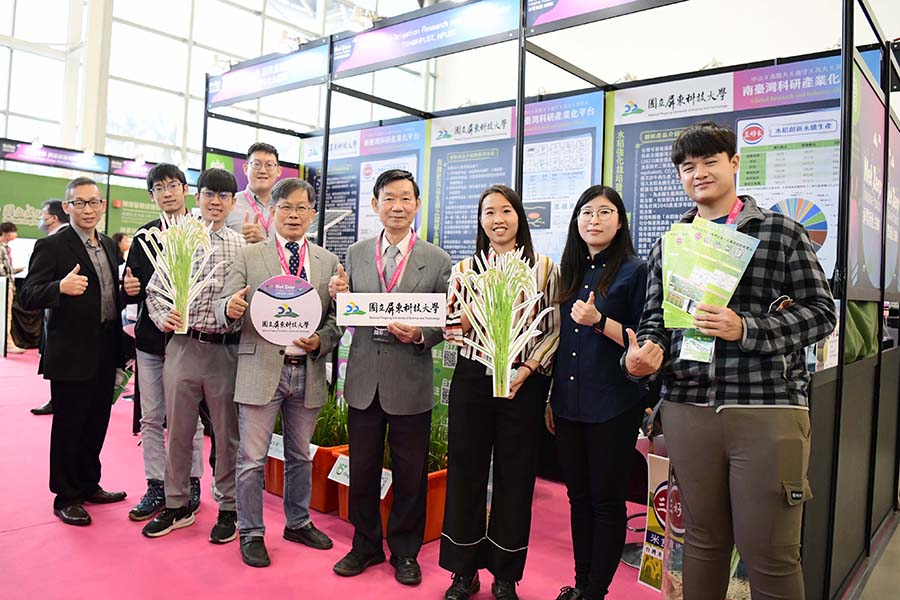The NPUST International Service Center for Irrigation R&D and its Taiwan Sustainability Hub shared the university’s latest achievements in the Sustainable Development & Net Zero Innovation Pavilion of the Kaohsiung Smart City & IoT Exhibition from March 30th to April 1st, 2023. The team from NPUST was represented by university vice-president, Chao-Lin Tuan, during the opening ceremony of the event while the International Service Center for Irrigation R&D was headed up by distinguished research fellow, Yu-min Wang, who exhibited their “Innovative and Sustainable Intensive Rice Cultivation and Precision Irrigation Farming Production Method”, “Sustainable and Innovative Organic Fertilizer and Probiotics Carbon Storage Farming Method”, and “Sustainable Carbon Reduction and Innovative Intelligent ICT Rice Precision Production Farming Method”—topics which are closely connected to issues capturing world-wide attention.
At the exhibition, Ms. Betty Bonnardel, CEO of the British manufacturer Farmer Charlie, was introduced to the NPUST team by the British Office Taipei director for innovation. Bonnardel and the researchers from NPUST enjoyed a friendly conversation and expressed hopes that in the future they would be able to engage in international industry-academic cooperation on data collection.
Additional exhibits from the university included the ” Wind Power Lighting Product Design for Bicycle Riding” by Ming-feng Wang of the NPUST General Research Service Center, and a number of Smart Mechatronics developments by Prof. Hudson Hsu, including a “Wind Powered Air Compression Device”. These, and the other exhibits from NPUST, demonstrated the university’s sustainable farming methods and its commitment the net-zero initiative.
Vice-President Tuan said “the NPUST team was very enthusiastic to participate in the Smart City exhibition. Research results show rice production techniques which use energy-saving and carbon-reducing technologies—technologies which are very important to us and which have had big impacts on Taiwan’s rice industry. Also, the wind power bicycle generator by the Research Service Center is able to charge itself and takes into consideration environmental protection and energy regeneration. We emphasized that by having senior professors from our university work together with young generations of teachers and researchers, our research and development energy can be more refined.”
Prof. Yu-min Wang said “in the past few years, the International Service Center for Irrigation R&D and Taiwan Sustainability Hub have provided many innovative solutions and much technical support towards the development of sustainable agriculture. These achievements are not only recognized by the academic community, but also create practical opportunities for sustainable development. We look forward to more innovations and progress with future research, and hope to make greater contributions to global sustainable development.”
The Smart ICT Rice Precision Production Method is a smart agricultural solution based on the Internet of Things and artificial intelligence technology. It can help farmers accurately measure soil conditions, climate, water quality, and crop growth throughout the rice production process. In this way farming can be done in a more efficient and energy-saving way and, in turn, can effectively lead to reduced carbon dioxide emissions.
The Innovative and Sustainable Intensive Rice Cultivation and Precision Irrigation Method is a sustainable method which works to improve rice yield and quality by optimizing soil management, selecting appropriate varieties, and applying irrigation systems. It can reduce water usage, soil erosion, and nitrogen fertilizer loss, thereby reducing production costs, and improving crop yield and quality.
The Sustainable and Innovative Organic Fertilizer and Probiotics Carbon Storage Farming Method is a sustainable agricultural solution that increases soil carbon storage through the use of organic fertilizers and probiotics. It can reduce the use of chemical fertilizers, improve the soil ecosystem, and improve the quality of rice crops.
Wind Power Lighting Product Design for Bicycle Riding utilizes the rotation of a fan to convert wind power into electrical energy. It then saves the electrical energy inside a battery to provide electronic power for LED lights and GPS.
Wind Powered Air Compression Device is an energy storage device for renewable energy. The main function of this system is to use an axial flow compressor to connect a wind generator in series to convert high-pressure air into electrical energy. The output voltage can be set and matched with the controller in the system and through stable control of air pressure, power adjustments and power generation, it can instantly convert high-pressure air into electrical energy to supply electrical appliances.
As a university that promotes sustainable development, National Pingtung University of Science and Technology is committed to conducting research and education in ways that can contribute to the sustainable development of society and the economy. Sustainable agriculture is one of the important means to achieve the goals of “net zero” sustainability and can lead to more breakthroughs for the construction of global “ecological civilization”. It is hoped that through the platform provided by the Kaohsiung Smart City Exhibition, more opportunities will arise for industry-university exchanges and cooperation on sustainable agriculture and net zero projects in the future.

